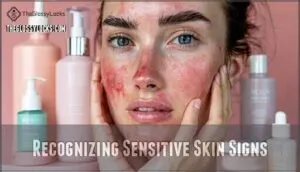This site is supported by our readers. We may earn a commission, at no cost to you, if you purchase through links.

Cleansing removes daily buildup of dirt and oil, while moisturizing maintains your skin’s protective barrier and prevents tightness.
Sun protection is your best defense against premature aging and skin damage.
These fundamentals work for all skin types when chosen correctly.
Oily skin benefits from lightweight, oil-free formulas, while dry skin needs richer, hydrating options.
Combination skin requires targeted application—lighter products on your oily T-zone, more moisture on dry areas.
The secret lies in understanding how these products work together as your skin’s daily armor to provide complete concepts of skin care, including the importance of gentle cleanser, and how they are essential for healthy skin.
Table Of Contents
Key Takeaways
- You’ll need just three products to start: a gentle cleanser, moisturizer, and SPF 30+ sunscreen—these form your daily foundation for healthy skin
- You should identify your skin type first (oily, dry, combination, normal, or sensitive) to choose products that actually work for your specific needs
- You can’t skip sunscreen—it’s your best defense against premature aging and skin damage, so apply it every morning and reapply every two hours
- You’ll see better results by staying consistent with simple morning and evening routines rather than overwhelming your skin with too many products to achieve better results
Essential Steps for Healthy Skin
Starting your skincare journey doesn’t have to feel overwhelming when you focus on the basics.
Three essential steps—cleansing, moisturizing, and sun protection—form the foundation of healthy skin that anyone can master.
Cleansing for a Fresh Start
Your skin’s daily battle begins with proper cleansing. Use lukewarm water with a gentle cleanser suited to your skin type.
Start your day by winning the battle against dirt, oil, and overnight buildup with the right gentle cleanser
Morning cleansing removes overnight buildup, while nighttime face washing eliminates makeup and daily grime.
Those with oily skin benefit from double cleansing using an oil-based precleanse followed by your regular cleanser. A great option is to shop for cleansers designed for sensitive skin.
Avoid harsh cleansing tools and ingredients that trigger sensitivity reactions.
Moisturizing for Lasting Hydration
After cleansing, your skin needs hydration to maintain its protective barrier. Think of moisturizing as giving your skin a drink – it prevents tightness and keeps you looking healthy.
Understanding basic skin care means knowing how different ingredients work together for ideal skin hydration. Natural ingredients can enhance skin health without harsh chemicals.
- Humectants vs. Emollients: Hyaluronic acid draws water in while ceramides smooth roughness
- Occlusive Ingredients: Create protective seals to lock moisture throughout environmental factors
- Night Creams: Richer formulas work while you sleep for deeper skin moisturizing
- Layering Products: Apply thinnest to thickest for better moisturizer selection results
Daily Sun Protection
Everyone needs a shield against UV damage, and broad spectrum sunscreen delivers that protection daily.
Choose SPF 30 or higher with zinc oxide or titanium dioxide as key sunscreen ingredients. These provide thorough UVB protection while blocking harmful rays.
Apply generously each morning and practice sunscreen reapplication every two hours.
Consider exploring various options for effective sun care. Making sun protection a daily habit prevents premature aging and reduces skin cancer risk substantially, providing a strong defense.
Identifying Your Skin Type
Understanding your skin type is the foundation of effective skincare that actually works for your unique needs.
You’ll save time, money, and frustration by choosing products that match whether your skin is oily, dry, combination, normal, or sensitive.
Identifying Your Skin Type – Introduction
Understanding your skin type is the foundation of effective skincare that actually works for your unique needs.
You’ll save time, money, and frustration by choosing products that match whether your skin is oily, dry, combination, normal, or sensitive.
Oily, Dry, Combination, and Normal Skin
Your Skin Type ID determines everything from Makeup Choices to Targeted Serums.
Understanding whether you have oily skin, dry skin, combination skin, or normal skin helps with Layering Products effectively.
Seasonal Changes can shift your skin type too.
- Oily skin: Shiny T-zone, enlarged pores, frequent breakouts
- Dry skin: Tight feeling, flaky patches, lacks natural moisture
- Combination skin: Oily forehead and nose, dry cheeks
Recognizing Sensitive Skin Signs
Recognition starts with understanding your body’s alarm bells. Sensitive skin reacts easily to product reactions and environmental factors, showing redness triggers like stinging or burning sensations.
You’ll notice itchiness causes discomfort after using new products. Skin irritation appears as patches of skin redness, especially around your cheeks and forehead.
These signs mean you need gentle skin care and basic skin care routines with fewer active ingredients. Managing this requires understanding causes of sensitive skin, which is crucial for sensitive skin and overall skin care.
Matching Care to Your Skin Needs
Once you’ve recognized your skin’s unique signals, matching your care becomes straightforward.
Your skin type identification guides every product choice in your basic skincare routine.
Here’s how to create targeted solutions:
- Oily skin: Choose gel cleansers and lightweight, oil-free moisturizers
- Dry skin: Use cream cleansers and rich moisturizers with ceramides
- Combination skin: Apply different products to your T-zone and cheeks
- Sensitive skin: Select fragrance-free, gentle formulations with minimal ingredients
- Normal skin: Maintain balance with moderate hydration and protection
Understanding ingredient synergy and proper product layering guarantees your skincare routine steps work together effectively, while seasonal adjustments keep your skin comfortable year-round.
Choosing The Right Skincare Ingredients
Now that you know your skin type, you’ll want to choose ingredients that work specifically for your needs.
The right active ingredients can transform your routine from basic maintenance into targeted skin improvement that delivers visible results.
Hydration Boosters: Hyaluronic Acid and Ceramides
For ideal skin hydration, hyaluronic acid and ceramides work like your skin’s best friends.
Hyaluronic acid binds up to 1,000 times its weight in water, providing instant plumping power and addressing dehydration signs.
Ceramides strengthen your moisture barrier, preventing water loss while supporting natural skin barrier function.
A popular choice is hyaluronic acid serum, known for its effectiveness.
When product layering, apply hyaluronic acid first, then ceramide-rich moisturizers for maximum skin hydration benefits.
Brightening and Repair: Vitamin C and Retinol
Chasing radiance? Vitamin C benefits your skin by blocking dark spots, while retinol boosts repair for smoother skin.
Don’t mix these two at the same time to dodge Retinol side effects. Layer vitamin C in the morning, then retinol at night.
Just remember:
- Sun sensitivity increases
- Use sunscreen daily
- Gradual use prevents irritation
- Long-term usage rewards antiaging benefits
Oil Control: Niacinamide and Lightweight Formulas
With niacinamide, you’ll tackle oily skin head-on. This powerhouse ingredient reduces sebum production by 21% while minimizing pore appearance. Pair it with lightweight moisturizers for ideal oil control without clogged pores.
Niacinamide also helps to enhance the skin barrier, which can indirectly reduce sebum production.
| Niacinamide Benefits | Lightweight Formulas |
|---|---|
| Sebum regulation proven | Fast-absorbing texture |
| Pore minimization effects | Noncomedogenic properties |
| Matte finish results | Layer-friendly application |
| Barrier support function | Shine-free hydration |
Choose products with 2-5% niacinamide concentration for best results in your skincare for beginners routine.
Simple Morning and Night Routines
You’ll want to establish consistent morning and evening skincare routines to maximize your skin’s health and appearance.
The key is keeping things simple with proven steps that work together to cleanse, protect, and repair your skin around the clock, using proven steps.
Morning Routine Steps and Best Practices
Your morning skincare routine starts with gentle cleanser selection—use lukewarm water to avoid stripping natural oils.
Follow with antioxidant serums containing vitamin C to fight free radicals.
Proper layering products means applying thinnest to thickest formulas.
Finish your basic skin care routine with SPF application for essential UV protection.
This morning protection sequence takes just five minutes but delivers lasting results.
Nighttime Care and Recovery
Your skin’s repair work happens while you sleep, making nighttime routines essential for basic skin care.
This window allows ideal product absorption and supports natural cell turnover processes. Fragrance-free cleansers can reduce redness.
- Remove makeup thoroughly – Use gentle cleansers or micellar water
- Apply repair serums – Vitamin A products boost overnight hydration
- Layer hydrating serum – Hyaluronic acid maintains skin barrier function
- Finish with night moisturizer – Ceramides support sleep quality recovery
Exfoliation and Toner Use
While gentle exfoliation methods remove dead skin cells twice weekly, over-exfoliation increases irritation risk by 28%.
Chemical exfoliants like salicylic acid reduce acne lesions by 38% within four weeks.
Toner ingredients such as niacinamide control oil in 82% of users, and physical exfoliation suits dry patches, while alcohol-free toners decrease irritation by 32%.
Your basic skincare routine benefits from gradual introduction of these products.
Lifestyle Habits for Radiant Skin
Your skincare routine works best when you support it with healthy lifestyle choices that nourish your skin from the inside out.
Simple daily habits like drinking enough water, getting quality sleep, and managing stress can transform your complexion more than any expensive product alone, which is why managing stress is crucial.
Diet and Hydration Tips
Your diet and water intake directly impact your skin’s appearance.
What you eat shows up on your skin—hydrate wisely and watch your complexion glow
Drinking at least 2 liters daily improves skin elasticity by supporting cell turnover.
Omega-3 fatty acids from fish reduce inflammation and lower acne risk by 35%.
Vitamin C boosts collagen production, while zinc deficiency affects 17% of adolescents with slower skin recovery.
Avoid high-glycemic foods that increase acne prevalence by 20% and lead to poorer skin health due to slower skin recovery.
Sleep and Stress Management
Prioritizing Sleep Quality and stress management creates the foundation for radiant skin.
Adults sleeping less than six hours nightly show 30% higher aging markers, while chronic Stress Hormones disrupt your Skin Barrier function.
During rest, Cellular Repair processes accelerate healing and hydration.
Managing Mental Wellbeing through relaxation techniques reduces inflammatory markers by 25%, supporting healthy skin habits and an ideal lifestyle for skin health.
Common Mistakes to Avoid
Beginners often sabotage their basic skin care by over-exfoliating daily, which damages your skin barrier.
Skipping sunscreen remains the biggest skincare mistake, causing premature aging.
Product overload overwhelms your skincare routine—stick to essentials.
Ignoring ingredients in product selection leads to reactions.
Neglecting neck care creates uneven aging patterns throughout your routine, affecting your overall skincare routine.
Frequently Asked Questions (FAQs)
How often should skincare products be replaced?
Studies show that 30% of people keep expired skincare past the recommended period.
Most products last 12 months after opening.
Replace sunscreens annually, actives every 6-12 months, and cleansers yearly for maximum effectiveness.
Can skincare products expire and become harmful?
Yes, skincare products can expire and become harmful.
Expired products lose effectiveness and may harbor bacteria, causing irritation, breakouts, or infections.
Check expiration dates regularly and replace products that smell off, change texture, or separate.
What order should multiple serums be applied?
Apply serums from thinnest to thickest consistency. Start with water-based serums like vitamin C, then oil-based ones. Wait 30 seconds between applications for proper absorption and effectiveness.
How long before seeing skincare routine results?
Like watching a garden bloom, your skin’s transformation takes patience. You’ll notice subtle changes in 2-4 weeks, with significant improvements emerging after 6-8 weeks of consistent daily care.
Are expensive skincare products always more effective?
Expensive doesn’t mean better for your skin. Many drugstore products contain identical ingredients to luxury brands. Price often reflects packaging, marketing, and brand prestige rather than effectiveness or quality.
Conclusion
Mastering basic skin care essentials isn’t rocket science—it’s about consistency and choosing products that work for your unique skin.
You’ve learned the fundamental trio of cleanser, moisturizer, and SPF 30+ sunscreen forms your daily foundation.
Remember to identify your skin type, select appropriate ingredients, and maintain simple morning and evening routines, which, Combined with healthy lifestyle habits, will transform your complexion over time.
- https://my.clevelandclinic.org/staff/19843-shilpi-khetarpal
- https://us.typology.com/library/niacinamide-to-improve-the-condition-of-oily-skin
- https://drsabrina.com/blogs/eye-care/is-niacinamide-good-for-oily-skin
- https://www.theinkeylist.com/blogs/news/best-and-worst-ingredients-for-oily-skin
- https://pmc.ncbi.nlm.nih.gov/articles/PMC8389214/











